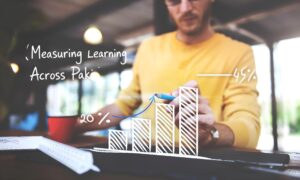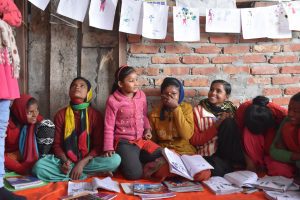Literacy & Non-Formal Basic Education
Pakistan is among the countries in the world with very low literacy levels. According to the Ministry of Federal Education and Professional Training, the literacy rate in Pakistan is 62 percent. This means that about 60 million people do know how to read or write.
Formal education is generally a means of educating individuals, however, it is often hard to meet the requirements of disadvantaged children and youth. According to the 2017 NEP, around 25 million children in Pakistan between the ages of 5 and 16 do not attend school. The formal education system cannot reach these millions of children and adolescents who are illiterate. Non-formal education (NFE) is an alternative to standard elementary schooling. Non-formal education helps adolescents who dropped out of conventional schooling before acquiring reading and writing abilities.
Non-formal education refers to organized, structured programs and processes of personal and social education aimed at enhancing a variety of skills and competencies outside the conventional educational curriculum. Article 25-A mandates formal and non-formal educational programs for about 25 million out-of-school children.
The Basic Education Community Schools (BECS) non-formal basic education (NFBE) program is being run by the Federal Government in line with the National Education Policy of 2017. The National Commission for Human Development (NCHD) also manages feeder schools around the country.
The Punjab Literacy and NFBE Department is funding 10,632 NFBE Centers. The Elementary Education Foundation sponsors 1,430 NFBE Centers in KP. Other provinces do not fund any NFBE schools from their own treasuries. Hence, the current NFBE programs in Pakistan are insufficient to reach the 22.64 million children ages 5 to 16 who are out of school. In March 2020, the Government of Pakistan issued the first policy on literacy and non-formal basic education in Punjab. As a result of this approach, Pakistan will soon discover new opportunities in the field of education.
CREDP envisions that the main point of literacy is to make sure that people never stop learning. One of the main reasons why Pakistan has so many issues is because of widespread illiteracy. It is crucial to recognize that the formal education offered at the majority of public and private schools is insufficient to satisfy the educational requirements of all. The fact that not all four provinces are enforcing any changes or regulations regarding the execution and implementation of literacy and non-formal basic education is a major bottleneck in our system. Pakistan Vision 2025 has set a target of universal literacy by the year 2025; however, the provinces of Sindh and Baluchistan aren’t even giving this goal any thought. To combat illiteracy, it is imperative that all levels of government recognize the value of informal education and work to implement policies and programs that will lead to universal literacy.
LATEST
UPDATES

Measuring Learning Across Pakistan: What NAT 2026 Means
NAT 2026 includes private schools and introduces foundational assessments, aiming to improve learning outcomes in Pakistan.
LATEST PUBLICATIONS

Measuring Learning Across Pakistan: What NAT 2026 Means
NAT 2026 includes private schools and introduces foundational assessments, aiming to improve learning outcomes in Pakistan.
LATEST PUBLICATIONS

Innovations in Non-Formal Education
Non-formal education refers to a variety of learning activities that take place outside of the conventional educational system.